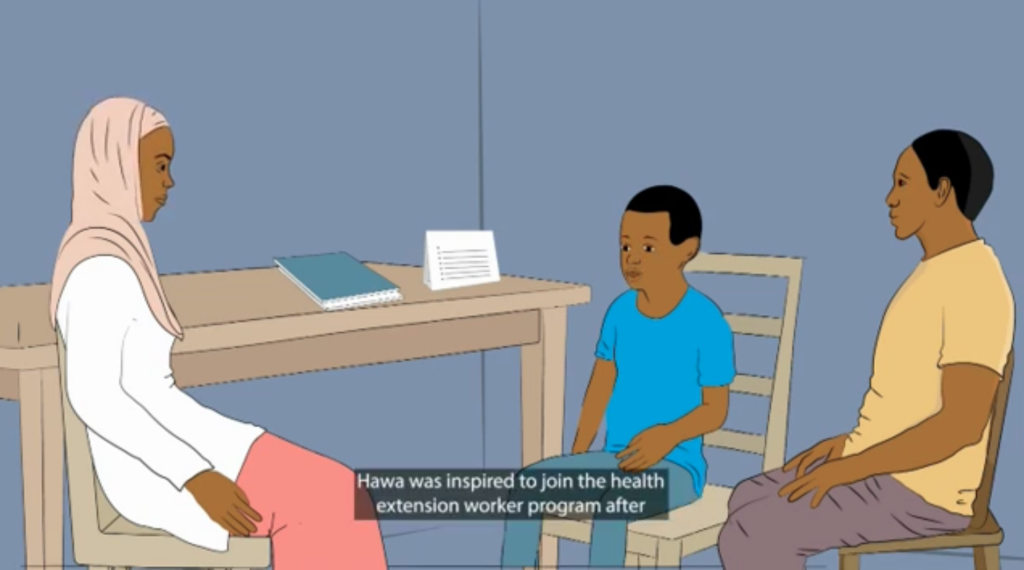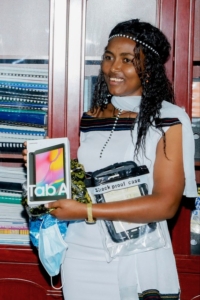Last Mile Health’s Ethiopia Program Director, Abraham Zerihun Megentta, delivered a lightning talk at Skoll World Forum. His remarks, included below, highlighted our work alongside the Ministry of Health to digitize training for community health workers.
My name is Abraham Zerihun and I lead Last Mile Health’s work in Ethiopia. It’s great to be here with you all today and to share the virtual stage with this amazing group of speakers.
The common thread among us is innovation, whether we are trying to improve the public health response in Brazil or track disease outbreaks through waste water testing. I’m excited to talk to you today about an area that is ripe for innovation: training.
Here’s the thing about training: it is absolutely essential. Health workers need continued education through their careers to provide quality care. This is true for doctors, it is true for nurses and midwives. And it is true for community health workers, who are local people trained to provide basic healthcare to their neighbors.
We have the tools to do training better. Using digital technology, we can deliver better trainings, faster, and more cost-effectively, to support the delivery of high-quality healthcare.
The COVID-19 pandemic clearly demonstrated this potential – health workers around the world needed real-time access to shifting information on pandemic response protocols. Digital tools put this information within reach.
In Ethiopia, we have just 1 doctor for every 10,000 people. And 90 million people – 80% of our population – live in rural areas. This means that when COVID-19 struck, Ethiopian health workers were already stretched. And they were spread out, in hard-to-reach areas across the country.
The Ministry of Health, which has traditionally relied on in-person trainings for health workers, needed a new approach. In May 2020, just two months into the pandemic, Ethiopia and Last Mile Health launched the COVID-19 Ethiopia App. The app provides access to multimedia training and skills assessments that once downloaded are available for offline use. Since its launch it has put up-to-date information in the pockets of more than 11,000 health workers.
The pandemic prompted local innovation in Ethiopia–and we can apply those innovations to transform training for health workers in Ethiopia and around the world. We’re already putting this into action – we’re applying lessons learned from the COVID-19 app to better train health extension workers on the delivery of routine primary care.
Over the past year, we have been working with the Ministry of Health to digitize maternal and child health training for Ethiopia’s 40,000 health extension workers.
We started here because maternal and child health is a high-impact intervention – reducing maternal and child mortality is a key area of impact for community health workers.
 We developed a multimedia curriculum in two local languages. We included features like character-driven animated videos and combined it with in-person training. So far we’ve trained more than 1,000 health extension workers who are serving nearly 3 million people. We are seeing in the data that they have greater knowledge and skills – and we are hearing from them that their training experience has immensely improved.
We developed a multimedia curriculum in two local languages. We included features like character-driven animated videos and combined it with in-person training. So far we’ve trained more than 1,000 health extension workers who are serving nearly 3 million people. We are seeing in the data that they have greater knowledge and skills – and we are hearing from them that their training experience has immensely improved.
Health extension workers are reporting that the trainings are more engaging and more accessible. Each topic is covered multiple times in different ways – as a lecture, as animation, videos, text, and a quiz. And the materials are easily referenced anytime, anywhere, making them a useful resource for health extension workers when they return to their posts.

Workinesh Getachew
Workinesh Getachew is one example of a community health worker who is better able to serve her community now. Workinesh is a 22 year-old health extension worker in the Oromia region of Ethiopia. The rural community she serves lacks basic infrastructure, including running water and electricity. People often travel more than 7 hours to gather water.
Despite these challenges, Workinesh received the highest score of all the trainees in the region and here’s what she told us:
“Previously, when going back home after trainings, sometimes we might not even take the printed modules back. But this is on our mobile device.” And, she said, “The video content, the dramas, the stories are fun, engaging and motivating.”
All of this means better care for patients. It means better counseling for family planning, improved care for newborns at birth, more accurate diagnosis of malnutrition, and better management of sick children.
The potential for this work goes far beyond COVID-19 and it goes beyond maternal and child health. Once we build systems and proof of impact, we can digitize curriculums on first aid, emergency response, non-communicable diseases and more. We can improve training for 40,000 health extension workers in Ethiopia and contribute to new ways of training community health workers across sub-Saharan Africa. All of this makes us better able to reach every patient with high-quality care.
We’re grateful to be working alongside many of you to improve the quality of care in Ethiopia.
Thank you.




